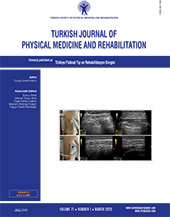Evaluation of the effect of accompanying lymphedema on the quality of life and anxiety level of caregivers of patients with breast and genitourinary system cancers
2 Ankara City Hospital, Coordinator Head Physician, Ankara, Türkiye
3 University of Health Sciences, Gülhane Faculty of Physiotherapy and Rehabilitation, Ankara, Türkiye
4 Department of Physical Medicine and Rehabilitation, Ankara City Hospital, Ankara, Türkiye DOI : 10.5606/tftrd.2024.13279 Objectives: This study aimed to determine the effect of accompanying lymphedema in patients with breast or genitourinary system cancer on the quality of life and anxiety levels of caregivers of these patients.
Patients and methods: Sixty-three caregivers (37 males, 26 females; mean age: 47.5±14.4 years; range, 20 to 80 years) of patients with breast or genitourinary system cancer and lymphedema, 40 caregivers (21 males, 19 females; mean age: 43.9±15.6 years; range, 18 to 75 years) of patients with breast or genitourinary system cancer without lymphedema, and 52 healthy volunteers (15 males, 37 females; mean age: 37.0±10.8 years; range, 23 to 68 years) as the control group were included in the cross-sectional study between May 10, 2021 and August 10, 2021. Sociodemographic information of the caregivers and information about the cancer diagnosis of the patients were recorded. The anxiety level of the caregivers was assessed with the Beck Anxiety Inventory (BAI), hopelessness level with the Beck Hopelessness Scale (BHS), and quality of life with the Caregiver Quality of Life Index-Cancer (CQOL-C).
Results: There was no statistically meaningful difference between the caregivers of patients with and without lymphedema and the control group regarding anxiety (p=0.818). The hopelessness level was higher in caregivers of patients with lymphedema compared to healthy controls (p=0.011). No statistically meaningful difference was found in CQOL-C burden, disruptiveness, positive adaptation, or financial concerns subscales in caregivers of patients with and without lymphedema (p=0.697, p=0.209, p=0.823, p=0.855, and p=0.257, respectively). Continuous caregiving was negatively associated with the total CQOL-C score in caregivers of patients with lymphedema (p=0.031). Complex decongestive therapy was negatively associated with high BAI and BHS scores (p=0.038 and p=0.034, respectively).
Conclusion: Lymphedema has a negative impact on hopelessness, while complex decongestive therapy has positive effects on anxiety and depression. Continuous caregiving may be considered a risk factor for high total CQOL-C scores.
Keywords : Anxiety, cancer, caregiver, lymphedema, quality of life

















